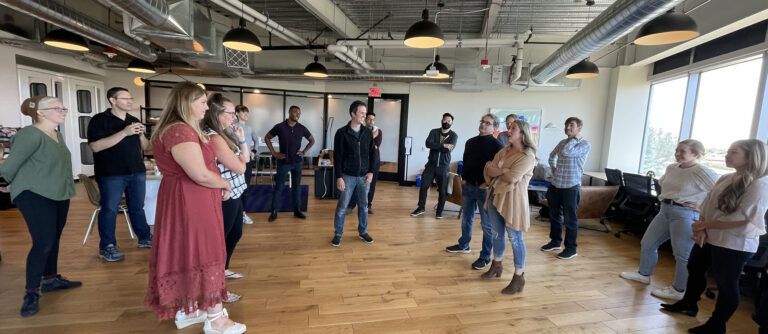The difference between good companies and great companies is not the quality of their ideas. It’s their ability to anticipate and act on the needs of their customers. Widespread empathy is about getting every single person in an organization to have a gut-level intuition for the people who buy their products and services–the folks who really matter.
How many times have you stared at a competitor’s new product and said, “We had that idea two years ago, but we just didn’t act on it.” Well, why not? Did you think the market research wasn’t quite right? Did you become convinced that it wasn’t a good idea when you couldn’t rally other people around it? Did people get in your way with stupid or irrelevant questions that tied the team up in a state of analysis paralysis? The difference between good companies and great companies is not the quality of their ideas. It’s their ability to anticipate and act on the needs of their customers. Companies with a widespread sense of empathy prosper over the long term.
Every one of us gets what empathy is on an individual level: the ability to reach outside of ourselves and walk in someone else’s shoes. To get where they’re coming from–to feel what they feel. As I titled my book, we’re all Wired to Care. And it’s high time our customers were, too. Widespread empathy is about getting every single person in an organization to have a gut-level intuition for the people who buy their products and services–the folks who really matter. When your organization develops a shared and intuitive vibe for what’s going on in the world, you’re able to see new opportunities faster than your competitors, long before the rest of us read about it in The Wall Street Journal. You have the courage of your convictions to take a risk on something new. And you have the passion to stick with it, even if it doesn’t turn out right the first time.
Imagine a place where every person has the same intuitive connection to the world of their customers. Not just the folks in marketing, but the people in R&D, too…and finance, and HR, and legal. Imagine a place where some guy who works in Accounts Payable has a gut level intuition for how his customers think. And then, when it comes time to revise the company billing policies, that guy realizes that there’s one way to change the system that might really help customers out and another that might totally enrage them. At a company infused with widespread empathy, that person in accounts will do the right thing, as will thousands of others across the organization, which adds up to a huge amount of value to customers.
So how do you get Widespread Empathy? There are really three principles:
1. Make it easy: Provide lightweight methods for people in your company to connect with the outside world.
2. Make it everyday: Surround your work environment with information about the lives of your customers.
3. Make it experiential: Ditch the customer insight PowerPoint and go feel what other people are feeling.
Make It Easy
One fatal error many leaders make when seeking change is to try to do too much of it all at once. It’s better to go a little at a time. That’s why successful empathy programs don’t begin by mandating that every employee go on ethnographic field research trips. A lot can be accomplished by providing simple and short ways for everyone in the company to spend a little time thinking like their customers. For this very reason, there is an actual Target store next to Target headquarters. Any Targeteer can walk downstairs, meet a few Target customers, and become a shopper themselves. Many retail companies are located miles from their nearest store, which makes it hard for their employees to walk in the shoes of their customers. Target just asks you to walk downstairs and pick up your household essentials.
Make It Everyday
The whole point of Widespread Empathy is to build a strong, implicit understanding of ordinary folks into your company. And the best way to do that is to make it normal to be thinking about them all the time. This is one of Harley- Davidson’s secret strengths. Harley’s office is a shrine to the motorcycle culture that the company has helped to create. Walking down an aisle of otherwise ordinary office cubicles, you’re confronted by an endless display of photos and signs from famous bike rides and exquisitely painted motorcycle gas tanks. On one wall, snapshots capture scenes from one employee’s recent bike trip down the coast of California. Other walls proudly display banners and photos from rallies and other events, including the pilgrimage that hundreds of thousands of riders make every year to Sturgis, South Dakota. It is impossible to work at Harley-Davidson and not learn a lot about the people who buy the company’s motorcycles.
Make It Experiential
Perhaps the most insidious trend in business these days is an over-reliance on quantitative data at the expense of real world experience. In our quest for reliability, it’s possible that we’ve created an entire generation of assistant marketing managers who believe that if they have five interesting bullets on a PowerPoint page, they understand their business. All business happens in the real world, so people from companies should spend more time there, too. When Lou Gerstner became IBM’s CEO in 1993, he created “Operation Bear Hug,” a massive program that required the company’s top 250 managers to visit at least five of the company’s biggest customers in just three months. And they weren’t there to sell products and services. Their task was to just listen to customers’ concerns and think about how IBM could help. At the time, it seemed like a crazy way to use executives’ time. But the company’s dramatic turn-around and successful entry into professional services revealed the wisdom of the move. Today, routine visits to customers are simply the way it works at IBM.

 Dev Patnaik
Dev Patnaik


